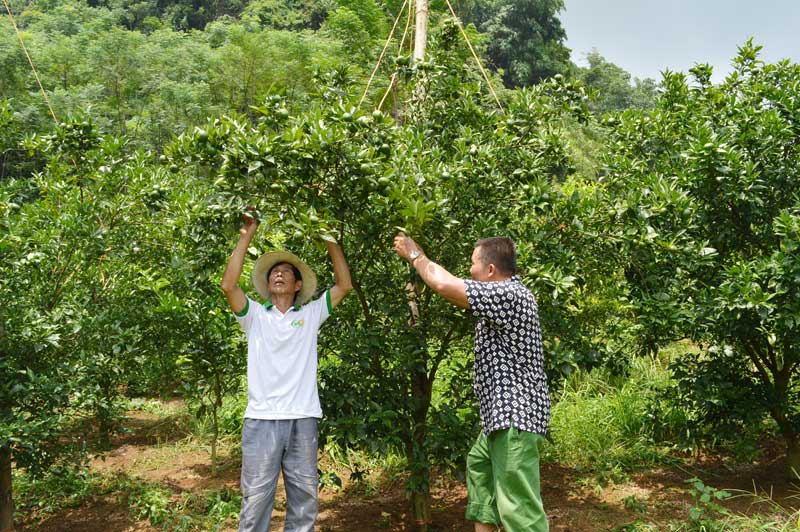
(HBO) – The Thung Rech area in Tu Son commune of Kim Boi district has seven hamlets, five of which are home to people who moved here to give land to the construction of the Da River reservoir in the 1990s. When they began settling down here, population in the area was scattered. They have built houses and farmed crops, turning this desolate land into fertile and vast sugar cane and maize fields.
Quach
Cong Tien, a resident in Kim Bac 2 (left), attends to Canh orange trees in his
orchard that covers more than 3ha of land.
It is difficult to list all difficulties and
hardships local residents have faced as well as their efforts to transform the
whole Thung Rech area into a luxuriant and fertile land. People have shifted
from farming the traditional crops of sugar cane and maize to cultivating
citrus trees. Many families have planted orange, tangerine, grapefruit and
longan trees, thus improving economic benefits and income. With their new ways
of thinking, some pioneers have developed new farming models, helping to give a
facelift to the local economy.
Ly Thi Kim, a resident in Kim Bac 4 hamlet, has
three orange gardens with more than 1,000 trees planted three years ago. She is
also farming maize, harvesting about 20 – 30 tonnes of corn each crop.
Meanwhile, the family of Quach Cong Tien in Kim
Bac 2 hamlet, a member of the Muong Dong Cooperative, has invested in a farm
covering more than 3ha of land to cultivate citrus trees. Tien said economic
benefits from sugar cane and maize farming is decreasing. If 100kg of maize
seeds could generate 200 million VND in the past, the revenue has fallen down
to around 50 million VND at present. The sale of sugar cane is also no longer
stable like it was in the past when sugar cane was sold to sugar factories.
Therefore, his family decided to invest in fruit tree cultivation. His entire
farm is now under Canh orange and Tan Lac red grapefruit trees which have borne
fruit. Since settling down here, the life of local people has become stable
with positive changes.
In spite of natural advantages such as
favourable climate and fertile soil, residents in the Thung Rech area still
face numerous difficulties. While the main road linking hamlets has been
concreted, most of other roads traversing hamlets and fields are made of earth and
being degraded, affecting travel and transport of farm produce. A water supply
system built in the area has also broken down, forcing locals to use water from
wells and springs for daily and farming activities. Due to the low per capita
income of about 10 – 13 million VND per year, the number of poor households
remains high such as 27 of the 41 households in Kim Bac 2 hamlet, or 16 of the
31 households in Kim Bac 4 hamlet. The life has been stable, but how to have
sustainably productive livelihoods is still a concern for local residents.
The emulation movement "Hoa Binh joining hands to build new-style rural areas” has been widely spreading, becoming a driving force that motivates the localities to renew rural landscapes and improve the material and spiritual lives of the residents. In this movement, the people play a central role-both as the main implementers and direct beneficiaries of its outcomes.
In response to the global digital revolution, Hoa Binh Newspaper is transforming itself into a modern and multi-platform media hub, blending cutting-edge technology with a restructured newsroom and a new generation of tech-savvy journalists.
Hoa Binh province’s Association of the Elderly recently held a conference to review the project on expanding the inter-generation self-help club model until 2025.
In a move to implement Resolution No. 57-NQ/TW, issued on December 22, 2024 by the Politburo, which targets breakthroughs in science-technology development, innovation, and digital transformation, the Hoa Binh provincial Department of Health has issued a plan to roll out the "Digital Literacy for All” campaign within the local health sector.
An Nghia Commune (Lạc Sơn District) is one of the communes that achieved the tha standard of the national new rural area in 2018. Entering a new development phase, the commune is now trying to meet the criteria for the advanced new rural development. With the strong political will and the public consensus, the commune is gradually overcoming the challenges to reach this goal, aiming for the sustainable development.



